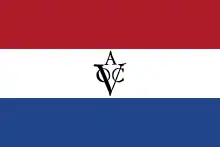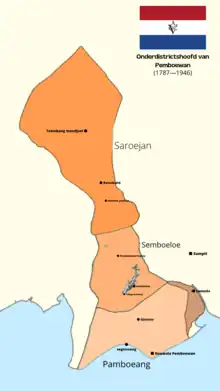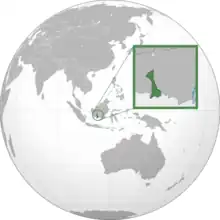Pemboewan
Pemboewan or Pemboeang (Banjar: pambuang walanda) was a subdistrict (Dutch: onderdistrict) of the Dutch East Indies, located in modern-day Central Kalimantan, Indonesia.
| Pemboewan Onderdistrict Pemboewan | |||||||||
|---|---|---|---|---|---|---|---|---|---|
| Onderdistrict of Dutch East Indies | |||||||||
| 1787–1946 | |||||||||
 Dutch East indies Company's Flag in Pembuang | |||||||||
 | |||||||||
 | |||||||||
| Capital | Sampit (1797–1898) Telaga Pulang (1898–1902) Pembuang Hulu (1902–1905) Kuala Pembuang (1905) | ||||||||
| History | |||||||||
| Government | |||||||||
| • Type | Inlands Bestuur | ||||||||
| Onderdistrictshoofd (Asisten Kjai) | |||||||||
• 1834 | Kjai Ngabei Djaja-negara | ||||||||
• 1847 | Djoeragan Brahim (Ibrahim) | ||||||||
• 1850 | Raden Moeda (Radja Moeda) | ||||||||
• 1859 | Djaja Ngagara | ||||||||
• 1870 | Djoeragan Moehammad Seman | ||||||||
• 1906 | Kiai Achmad | ||||||||
| History | |||||||||
• Established | 1787 | ||||||||
• Disestablished | 1946 | ||||||||
| |||||||||
| Today part of | |||||||||
| History of Indonesia |
|---|
 |
| Timeline |
|
|
Pemboewan is believed to have been the forerunner of the current Seruyan Regency. This district was established not long after Sunan Nata Alam handed over Pembuang Banjar to the Dutch VOC.
History
Early history
The Pemboewan area was originally the territory of the Banjar Sultanate. At that time, a lot of area expansion was carried out by the Banjar Sultanate which made the Sultanate's territory very wide. At that time, this area was called Pambuang.[1]
According to the Radermacher report, in 1780 the head of the Pembuang area (now Seruyan Regency) was Raden Jaya.[2]
Since August 13, 1787, the Pembuang area (Seruyan Regency) was handed over by Sunan Nata Alam to the Dutch VOC. Even so, the first known regional head was Kjai Ngabei Djaja-Negara who ruled from 1834.[3]
Under Onderdistrict government
Before 1880, the Seruyan area consisted of 13 villages where government officials were called "Assistant Kjai" who ruled directly from Sampit. The villages were Beratih (now Kuala Pembuang), Telaga Pulang, Sembuluh, Pembuang Hulu, Asam, Durian Kait, Sandul, Sukamandang, Rantau Pulut, Tumbang Kale, Tumbang Manjul, Sepundu Hantu, Tumbang Darap. In 1880. With the rapid development and growth of villages, an onderdistrict was formed with the capital city at Telaga Pulang.
In 1902, the capital moved from Telaga Pulang to Pembuang Hulu but did not last long and in 1905, the capital in Pembuang Hulu was moved to Kuala Pembuang, because of its location on the south coast, so it was considered strategic, especially for government, transportation and economic activities at that time.
Disestablishment
In 1940, the Japanese Empire expanded its territory to the South, namely to the Southeast Asia region, getting into conflict with the Dutch East Indies. The Dutch East Indies fell to the Japanese. Japan took control of the Pemboewan in early 1941.
In 1946, the kecamatan of Seruyan was formed out of the onderdistrict of Pemboeang, with Kuala Pembuang as its capital. Seruyan then joined the Great Dayak region under the leadership of J. van Dyk, ending the Pemboeang era.[4]
De facto

According to the Staatsblad van Nederlandsch Indië of 1849, this region is included in the Zuid-ooster-afdeeling based on Besluit van den Minister van Staat, Gouverneur-Generaal van Nederlandsch-Indië. On August 27, 1849, No. 8.[5] In 1855, this area was part of the Zuider-afdeeling van Borneo.[6]
List of regional heads
| Number | Name | Start reigning | End of reign | Title |
|---|---|---|---|---|
| 1 | Kjai ngabei Djaja-Negara[7] | 1834 | 1847 | Asisten Kjai
Hoofd van Pemboewan |
| 2 | Djoeragan Brahim | 1847 | 1850 | Hoofd van Pemboewan, Sampit en Semboeloe[8] [9] |
| 3 | Raden Moeda | 1850 | 1859 | Hoofd van Pemboewan alleen
Radja Moeda[10] |
| 4 | Djaja-Negara | 1859 | 1870 | Hoofd van Pemboewan en Semboeloe[7] |
| 5 | Djoeragan Moehammad Seman | 1870 | 1906 | Districtshoofd van Pemboeang[11] |
| 6 | Kiai Achmad[12] | 1906 | 1945 | Asisten Kjai
Hoofd van Pemboewan |
References
- Malay: (Melayu) Johannes Jacobus Ras, Hikayat Banjar diterjemahkan oleh Siti Hawa Salleh, Percetakan Dewan Bahasa dan Pustaka, Lot 1037, Mukim Perindustrian PKNS - Ampang/Hulu Kelang - Selangor Darul Ehsan, Malaysia 1990.
- The New American Encyclopaedia (1865). "The New American Encyclopaedia: a popular dictionary of general knowledge". 2. D. Appleton.
{{cite journal}}: Cite journal requires|journal=(help) - Hindia-Belanda (1965). Bandjermasin (Sultanate), Surat-surat perdjandjian antara Kesultanan Bandjarmasin dengan pemerintahan2 V.O.C.: Bataafse Republik, Inggeris dan Hindia-Belanda 1635-1860 (PDF). Arsip Nasional Republik Indonesia, Kompartimen Perhubungan dengan Rakjat. p. 228.
- "Federal Indonesia, 1949-1950". Digital Atlas of Indonesian History. Robert Cribb. Archived from the original on 2017-02-14. Retrieved 10 August 2011.
- Staatsblad van Nederlandisch Indië, s.n., 1849
- J. B. J Van Doren (1860). Bydragen tot de kennis van verschillende overzeesche landen, volken, enz. Vol. 1. J. D. Sybrandi. p. 241.
- Tijdschrift voor Nederlandsch-Indië (1861). "Tijdschrift voor Nederlandsch-Indië". 23 (1–2). Nederlandsch-Indië: 205.
{{cite journal}}: Cite journal requires|journal=(help) - Landsdrukkerij (Batavia) (1848). Almanak van Nederlandsch-Indië voor het jaar (in Dutch). Vol. 21. Lands Drukkery. p. 81.
- Landsdrukkerij (Batavia) (1849). Almanak van Nederlandsch-Indië voor het jaar (in Dutch). Vol. 22. Lands Drukkery. p. 83.
- Raja Moeda Di publish dengan tajuk Regency Of Seruyan oleh Bupati H. Darwan Ali, Ir. H. Tarwidi Tamasaputra (Wakil Bupati), (Plh) H. Sutrisno, SH (Sekda).
- Landsdrukkerij (Batavia), Landsdrukkerij (Batavia) (1871). Almanak van Nederlandsch-Indië voor het jaar. Vol. 44. Lands Drukkery. p. 197.
- Dutch East (1906). Regeerings-almanak voor Nederlandsch-Indie (in Dutch). Vol. 2. Dutch East Indies. p. 243.
External links
- Complete history of Seruyan Regency (in Malay).